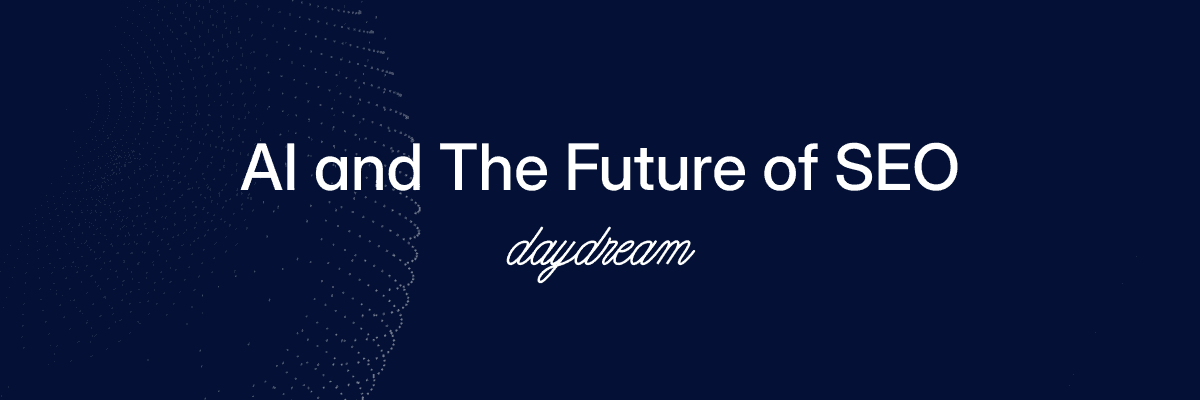#12: As long as businesses need to be found, then there's a need for SEO
Nov 25, 2024
AI and the Future of SEO


Hey friend!
You know that age-old question, “Is SEO dead?”
We’ve got great reason to believe no, thanks to some interesting data from Rand Fishkin and other experts. Not to mention, recent developments in Google’s antitrust saga with the DOJ that could lead to Google selling Chrome. More details below.
Oh, and for all those celebrating, happy Thanksgiving from our team at daydream! May your Black Friday and Cyber Monday campaigns kick off smoothly and without any last-minute hitches.
–Thenuka
[INSERT_SUBSCRIBE_CTA]
What’s new in AI and content?
⚖️ The DOJ wants Google to sell Chrome
Following its antitrust victory against Google over the summer, the U.S. Department of Justice (DOJ) is looking to dismantle the company’s dominance in the search and digital advertising markets. The recommendation grabbing the most attention right now is the forced sale of Google’s Chrome browser, which commands an estimated 67% global market share of web browsers. Besides selling Chrome, the proposal officials are working to prepare also stipulates separating Android from Search and Google Play. The big question weighing on our minds, though, is who would be able to buy Chrome?
What this means for SEO: If this proposal were to succeed, selling Chrome would drastically alter online advertising. Reminder: Since it defaults to Google Search, Chrome collects a vast amount of user search data, helping Google refine its search algorithms and enhance targeted advertising. Google’s not going down without a fight, of course—stay tuned for updates.
🐛 No more “parasite SEO” now that Google’s updated its site reputation abuse policy
Google has updated its site reputation abuse policy to crack down on “parasite SEO,” where third-party content leverages host sites’ ranking signals to manipulate search rankings. For example, that could be a medical site publishing unrelated content about social media services, or a sports site posting nutritional supplement reviews. The update comes as a timely follow-up to earlier reports about Google demoting content that’s different from the rest of your site, which affected CNN and Forbes. As one SEO observes, “Pretty wild how Google waited until days before Black Friday & Cyber Monday to issue Site Reputation Abuse manual actions… Affected sites were all preparing for their biggest week of the year right now.”
What this means for SEO: Google’s updated policy reiterates the need to create content that earns rankings independently, without relying on other domains’ reputations. Moving forward, marketers need to be careful about partnerships involving third-party content—think guest posts and sponsored content. Site owners found in violation must remove or adjust offending content and await reconsideration to restore rankings.
✈️ More Google AI Overviews are appearing for travel searches
According to recent research from the SEO platform BrightEdge, Google AI Overviews (AIOs) now appear in 30% of travel-related queries—a 700% increase from September to October 2024. The surge shows a growing user interest in seasonal travel, local events, and neighborhood-specific activities, probably driven by holiday trip planning. One interesting report observation: more AIOs are appearing for specific queries like “family-friendly activities in Cookeville, TN” and “fall festivals in the Midwest.” Previously, the summaries mostly tackled general phrases like “things to do in Chicago.”
What this means for SEO: Marketers in the travel industry could see a dip in organic traffic as AIOs target more highly specific and localized queries. That said, these aren’t really the types of keywords that a short summary can cover adequately—chances are, people still want to read more in a listicle-style post. In any case, BrightEdge’s report advises creating content optimized for more refined search intent, like local events and neighborhood attractions, to snag those AIO citations.
Expert Insights
📊 Rand Fishkin: “How big is ChatGPT's market share of search?”
Rand Fishkin of SparkToro and Moz fame offers on LinkedIn a rough estimate of ChatGPT’s market share in search using a pie chart based on two key data sources: SimilarWeb for traffic comparisons and Datos for the number of searches. There are limitations to the data, but it’s an interesting cross-platform approximation—and the comments section also offers more food for thought. As Rand notes in one comment, “It's very clear from the data that they're [ChatGPT] not ‘taking a share of Google's pie.’ They're something new. Because if they were taking a share of Google, then Google's own numbers (searches/month, searches/searcher, total searches, visits, etc.) would be declining and that's not the case. Google keeps growing at a rate similar to the past 5 years.”
📢 Marie Haynes: “As long as there are businesses that need to be found, then there's a need for SEO.”
Given the advent of ChatGPT and other AI-powered chatbots, is SEO finally dead? Industry-leading SEO pros Marie Haynes, Ryan Robinson, Mark Williams-Cook, and Jeannie Hill weigh in during an AMA-style webinar hosted by Clearscope founder Bernard Huang—and their resounding answer is “no.” As Google seems to place more emphasis on brand authority and reputation, the panel also discusses the importance of pursuing other channels to complement traditional SEO content, including PR and video, since they build brand recognition.
Playbooks & Guides
⚙️ The Complete Guide to Programmatic SEO
In case you haven’t already heard, we recently launched our free guide to programmatic SEO (pSEO)! It breaks down what pSEO is and its future dominance in the SEO and content marketing landscape. To put the guide together, we talked to industry veterans like Brian Dean, Becky Westmoreland, and Eli Schwartz—so it’s not just abstract fluff or theory, but actually includes real examples and tips from experts who’ve walked the walk. The guide also includes step-by-step instructions for building a scalable pSEO engine, from ideation to advanced tactics for optimization and growth. If you’re curious whether pSEO could work for your business, check out our guide or at least bookmark it for later.